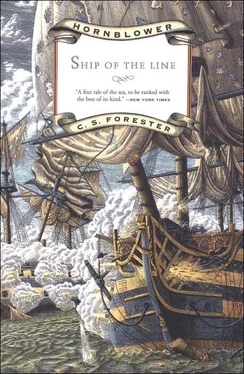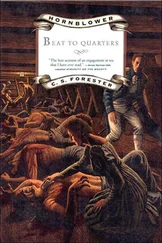“ Cassandra signalling, sir. ‘Submit—’.”
It was the first time Hornblower had ever had that word addressed to him. He had used it so often in signals to admirals and senior captains, had included it so often in reports, and now another officer was beginning a signal to him with the word ‘Submit’. It was a clear, definite proof of his growing seniority, and gave him a thrill keener even than he had known when a ship had first piped the side for him on his being posted. Yet naturally the word ‘submit’ ushered in a protest. Cooke of the Cassandra was not in the least anxious to be thus summarily dismissed from the scene of a promising action. He submitted that it would be better for the Cassandra to stay in sight of the French.
“Signal ‘Carry out orders acknowledged’,” said Hornblower, tersely.
Cooke was wrong and he was right—Cooke’s protest helped his decision to crystallise. A frigate’s whole function, what she was built for, was to enable the ships of the line to come into action. The Cassandra could not face a single broadside from one of the ships rolling along after her; if she could bring the Pluto and the Caligula into action she would have multiplied her own value an infinity of times. It was heart-warming to Hornblower to be not only convinced that he was right, but to be able to enforce the course of action he had decided upon. That six months’ difference in seniority made Cooke obedient to him, and would make him obedient all their lives—if ever Cooke and he flew their flags together as admirals, he would still be the senior and Cooke the junior. He watched the Cassandra shake out the reefs from her topsails and bear away westwards, with all her five knots’ superiority of speed being put to its best use now.
“Shorten sail, Mr. Bush,” said Hornblower.
The French would see the Cassandra vanish over their horizon; there was a chance that the Sutherland might keep them under observation without being seen. He stuck his telescope into his pocket and set himself to climb the mizzen rigging, sedately—even a little laboriously; it was imperilling his dignity to do so, when every hand in the ship could climb the mast quicker than he, but he had to see with his own eyes the enemy astern of him. The ship was plunging heavily in the following sea, and the wind blew keenly about his ears. It called for resolution to continue his ascent without undignified pauses, so as to appear merely as leisurely as a captain had a right to be, and yet neither timid nor awkward.
At last he found a secure perch on the mizzen topmast cross trees, and could train his glass on the heaving horizon. With her main topsail taken in the Sutherland’s speed was considerably reduced, and it could not be long before the French appeared. He saw them soon enough—a tiny rectangle of white just lifting over the horizon, then another beside it, and another, and another.
“Mr. Bush!” he roared. “Set the main tops’l again, if you please. And send Mr. Savage up here.”
The four French ships were rolling along in lubberly French fashion in a wide line abreast, half a mile apart—presumably their captains were afraid of collision if they drew closer—and it was a hundred to one that their lookouts would never notice the tiny dot which would be all they could see of the Sutherland. Savage came tumbling up beside him, hardly out of breath after his lightning scramble up the ratlines.
“Take this glass,” said Hornblower. “You see the French squadron? I want to hear instantly if they alter course, or if they headreach upon us, or we on them.”
“Aye aye, sir,” said Savage.
He had done all he could do now, when he reached the deck again. It only remained to wait, patiently, until tomorrow. Tomorrow would see some sort of battle, hopeless or even—or if there were no battle it would mean that the French had disappeared and he would go before a court martial. He was careful to keep his expression quite composed, and to try and appear as if he did not feel the tension of waiting in the least. It would be in the old tradition if he invited his officers to dinner and whist tonight.
The situation was one likely to disturb any captain’s sleep, with four hostile ships of the line to windward needing to be kept under observation, and with calculations continually bobbing up from the subconscious to the conscious regarding the chances of the Cassandra bringing down Admiral Leighton in time to cut off the enemy. The weather conditions were unsettling, too—the wind, having worked up nearly to a gale force towards evening, diminished until midnight, increased again, and then, with the inconsequence of Mediterranean winds, began to die away steadily.
Certainly Hornblower never expected sleep. He was too excited, and his mind was too active. He lay down on his cot when the watch was changed in the evening to have a rest, and, being quite convinced that he had no chance of sleeping he naturally fell into a heavy dreamless sleep so heavy that Polwheal had to shake him by the shoulder at midnight to awaken him. He came on deck to find Bush standing by the binnacle.
“Too dark for anything to be seen, sir,” said Bush, and then, excitement and exasperation getting the better of his formality, he growled, “Black as Newgate Knocker.”
“Have you seen anything of the enemy?”
“I thought I did, sir, half an hour back, but nothing to be sure of. Wind’s dropped a lot, too.”
“Yes,” said Hornblower.
As so often was the case at sea, there was nothing to do but wait. Two screened lanterns swayed down on the maindeck, where the watch lay at their stations by the guns; the keen wind harped in the rigging, and the ship rose and plunged in the following sea with a lightness and grace no one would expect of her who had only seen her with the wind abeam. Nothing to do but to wait; if he stayed on deck he would only fidget and display his nervousness, so that he might as well go and conceal his nervousness in his screened-off cot.
“Send for me at once if you catch sight of the enemy,” he said, with elaborate carelessness, and went back again below.
He lay on his cot with his mind busy, for he knew that having slept once there was no chance whatever of sleeping again. So perfect was this conviction that sleep ambushed him once more, leaped upon him unawares, as he lay thinking about the Cassandra , sothat it only seemed two minutes later that he heard Polwheal speaking to him as if from another world.
“Mr. Gerard’s compliments, sir, an’ it’s beginnin’ to get lighter, sir.”
It called for quite an effort to rouse himself and get up from his cot; only when he was drowsily on his feet did he begin to feel pleased at having been genuinely asleep each time that Polwheal came to call him. He could picture Polwheal telling his cronies about the iron nerves of the captain, who could sleep like a child on a night when the ship was aboil with the prospect of action.
“Anything to report, Mr. Gerard?” he said, as he reached the quarterdeck.
“No, sir. I had to reef down for an hour at two bells, it blew so hard. But it’s dropping fast now, sir, and backing sou’easterly.”
“H’m,” said Hornblower.
The faintest hint of light was beginning to tinge the gloomy sky, but nothing could be seen yet more than a cable’s length away. A south-easterly wind would be nearly foul for the French on their course to Barcelona; it would be dead foul for the Pluto and Caligula.
“Thought I felt the loom o’ the land, sir, before the light came,” said Gerard.
“Yes,” said Hornblower. Their course during the night would bring them close into Cape Creux of hated memory; he picked up the slate beside the binnacle, and, calculating from the hourly readings of the log, he made their position to be some fifteen miles off the cape. If the French had held the same course during the night they would soon have Rosas Bay and comparative security under their lee—of course, if they had not, if they had evaded him in the darkness, the consequence to him did not bear thinking about.
Читать дальше









